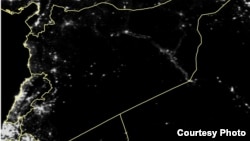More than 80 percent of lights across Syria have gone out since the conflict in that country began four years ago, according to an analysis of satellite images released by a coalition of humanitarian groups around the world.
The news highlights the impact of the war in Syria, where a dire humanitarian situation has seen the death toll exceed more than 200,000.
Nighttime satellite images show that since March 2011, Aleppo province, home of one of the largest cities in Syria now contested between government and rebel forces, has had 97 percent of its lights go out since the conflict began.
Damascus was the least affected province, with 33 percent of its lights going out, according to the research.
“[This research] can be very different from media reports, because it gives the whole picture of the Syrian conflict,” Xi Li, lead researcher on the project, told VOA. "I think I can do something for the Syrians,” he said when asked about his motivation for this project.
Li, a visiting scholar at the University of Maryland's Department of Geographic Sciences, said these were updated results of an earlier analysis he carried out. He said he started by getting basic images from different sources, including NASA, processing them, compiling them and then finally comparing the results for the different provinces.
The research was released by a coalition of more than 130 organizations from around the world called #withSyria and based on analysis of satellite images by scientists at the Wuhan University in China and the University of Maryland in the United States.
“It shows how terribly destroyed Syria is and how poor it is,” said Joshua Landis, director of the Center for Middle East Studies at the University of Oklahoma.
The Carnegie Endowment for International Peace wrote last year that in many areas of Syria there was no electricity because of “regime bombings, government-ordered cuts, and the rebels’ failure to manage local infrastructure.”
The news that 83 percent of lights around Syria have gone out is further evidence that the situation in Syria is having an impact on ordinary citizens, with nearly 4 million registered Syrian refugees, according to the U.N. High Commissioner for Refugees.
“Four years since this crisis began, Syria’s people have been plunged into the dark: destitute, fearful and grieving for the friends they have lost and the country they once knew,” David Miliband, president and CEO of the International Rescue Committee, said in a statement.
The conflict in Syria erupted in 2011 after an uprising was violently put down but soon turned into a civil war between government and rebel forces. The rise of groups such as the Islamic State has only complicated the conflict.
The research comes as questions remain about what the international community can do to end the conflict in Syria.
“I think that at this stage, probably the only option that is left is a summit between the United States, Russia, China, Iran and Turkey, and possibly with the participation of the Arab League … in order to reach a consensus on Syria,” said Amin Saikal, director of the Centre for Arab and Islamic Studies at the Australian National University.
However, the possibilities of an international consensus are dim after a report by international aid agencies said that two resolutions adopted by the U.N. Security Council have not improved the humanitarian situation in Syria.
Victor Beattie contributed to this report.




